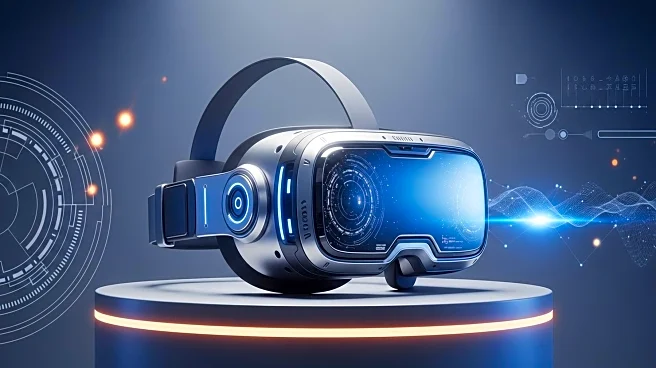What's Happening?
Extended Reality (XR) technology is poised for a significant breakthrough, driven by advancements in AI and wearable devices. At the Snapdragon Summit, industry leaders highlighted the potential of XR to transform user experiences. Google's SVP of devices and services, Rick Osterloh, emphasized that the technology is ready to create powerful new computing experiences. Qualcomm's VP of wearables, Dino Bekis, noted that AI is enhancing XR by providing immersive and seamless experiences, such as live translation features. Despite challenges in mainstream adoption, sales of XR devices like Meta's Rayban glasses have surged, indicating growing consumer interest.
Why It's Important?
The integration of AI into XR technology represents a pivotal moment for the tech industry, potentially reshaping how consumers interact with digital environments. This development could lead to new applications in communication, productivity, and entertainment, offering businesses opportunities to innovate and expand their offerings. As XR devices become more accessible, they may influence consumer behavior and drive demand for related technologies, impacting sectors such as retail, healthcare, and education. The success of XR could also stimulate investment in AI research and development, further advancing technological capabilities.
What's Next?
As XR technology continues to evolve, companies are likely to focus on improving device comfort and functionality to encourage wider adoption. Tech firms may invest in developing smaller, power-efficient devices that integrate seamlessly with existing wearables. The industry could see increased collaboration between AI and XR developers to enhance user experiences. Consumer feedback will play a crucial role in shaping future XR products, with companies aiming to address concerns about comfort and usability. The market may witness the introduction of new XR applications tailored to specific industries, expanding the technology's reach.
Beyond the Headlines
The rise of XR technology raises ethical and privacy concerns, particularly regarding data collection and user consent. As devices become more integrated into daily life, companies must navigate the balance between innovation and user rights. Additionally, the cultural impact of XR could lead to shifts in social interactions and communication norms, as virtual experiences become more prevalent. Long-term, XR may influence urban planning and architecture, as digital environments merge with physical spaces, creating new opportunities for design and functionality.










